We can assist you in getting the car or truck of your dreams.
Leasing is not something people are very familiar with, or, better yet, comfortable with. Although it is easy to understand at first, it gets complicated once you look closer into it. Leasing may suit your financial needs. MAYBE. You must understand it fully before signing a leasing contract. According to studies, Leasing allows plenty of opportunities to either cheat or defraud a consumer―or at the very least, to make it difficult to get the best deal available. Understand that this isn’t just my personal opinion. It truly is complex.
What is a Lease?
Leasing a car is like renting a car. You pay to use that vehicle. It is not yours, and it will not be yours once the contract is over. Unless your contract allows you to purchase that car for a calculated price. And that’s still something shady to consider. Sometimes, you may find yourself with a buy option on that vehicle. It rarely is worth buying. Not to mention that, during the lease, you will not be allowed to drive it as much as you want. There’s a limit to the mileage
And just like with an apartment lease, you can't decide halfway through to turn it back in. If you want to get out of your lease early, expect a large early-termination fee.
 Limitations and Penalties
Limitations and Penalties
Remember, you do not own this car. However, your responsibility towards it is the same as if it were your car. As a matter of fact, you might have to take better care of it than you would if it were yours. This includes oil change and brake checks. That is because you might get charged for any use and tear, as I will explain below. Fortunately, in many cases the car will be under warranty while the lease is in going on, so it will cover some of the repairs.
Before you consider a lease, calculate how much you will be driving every month. This is not like taking out a car loan. You will have to respect the mileage limit set on your contract. The limit is usually around 15,000 miles per year. You may negotiate some extra miles BEFORE you sign the lease contract. It is not like you can’t go over your limit. But, going over doesn’t come cheap (usually 25 cents per extra mile). Trust me, it adds up to quite an amount.
Leasing companies already expect some wear on their cars. But they expect it to be in good shape. Before signing the final contract, you need to have an idea of what they consider to be “in good shape.” Having an idea of what they expect might save you quite a bit of money when time comes to return the car. It might already be spelled out in the contract. Just make sure.
It might be a good idea to fix certain wear and tear before turning the car in. Again, it might save you money.
Payments
Leasing payments are much lower than car loan payments for similar vehicles. Why? Your lease payments are merely covering the difference between the current cost of the car and the expected value of the car at the end of this lease, or the "residual" value. In other words, you're paying for the depreciation, plus a leasing agent fee of course.
While doing your market research for what car to lease, consider one with a good holding value. You can get better leasing deals with such cars.
Lease price
Keep in mind that you may also negotiate a good lease just like you would negotiate buying a car. Lowering the price of the car will lower your monthly lease payments.
Don’t be discouraged if the leasing officer doesn’t seem too pleased about lowering the lease price. He doesn’t have to be happy with the final price you negotiate. You do.
 Types of Leases
Types of Leases
We’re looking into 2 types of leases: open-end and closed-end. Most common one being Closed-end leases. Once the lease is over, you just return the car, pay whatever wear and tear (and/or extra mileage) fees and be done with it. Any risk, including any value loss in the vehicle, is assumed by the Leasing Company. These leases are, however, more expensive than open-end leases. If, at the end of the lease, the value of the car is more than what that value was predicted to be, then you can buy the car at a somewhat “worth it” price. It’s not as simple as it might sound, and it might not be the best option. If you do buy it, it would be for a profit or for keeping the car.
When dealing with an open-end lease, the consumer takes the risk. IF, at the end of the lease, the car has lost its value, then you are the one who has to pay the difference between the average calculated value and the actual value of the vehicle. It’s no wonder why open end leases come cheaper to you, the customer.
Here’s something to keep in mind when looking for a lease: Fees. You’re not going to leave the dealership without leaving some money behind. They will get you on fees such as licensing fees, processing fees, etc.
Down Payments
Remember what I mentioned a few paragraphs above: Do your home research. One of the things to look for, if you’re going for a leased car, is a little or zero down payment. You can find these offers online or on your local newspaper, usually on Sundays. Sometimes it’s just one single dealership offering such a deal, or sometimes it is an entire car brand. If you’re set on a particular brand and/or model, and you can’t find any special lease deals, then my suggestion is that you be patient. It’ll happen.
Taxes
Finally a big break. Usually, when you buy a new car, you must pay taxes on the entire amount that the car is worth. In most states, when it comes to a lease, you’ll just pay taxes on the amount of the lease. And it doesn’t have to be paid in the beginning of the lease. You can spread it out over the extent of the lease contract.
Gap Insurance and Regular Insurance
Gap insurance is something that a dealership might require, most of the time it is included at no additional fees. It is just something to protect your money in case the car gets wrecked or stolen.
You will need regular insurance. In your contract, look for where it mention insurance.
You’ll then know what is the least amount of insurance that you must have on the lease.
 Before you sign the lease contract
Before you sign the lease contract
If you have poor credit scores/rating, you might find yourself in a pickle when deciding on a car lease rather than a car LOAN. Make sure you know where you stand, financially (credit), before rushing into anything. Check for any mistakes/errors in your score. It might make all the difference when it comes time for you to make a decision.
Just like a car loan, you are going to find out that the length of the lease can also be negotiated or be offered to you upfront in the first place. A good advice to you is to keep in mind that a long lease term might take you past the vehicle’s warranty length. This might lead to some unwanted and financially unplanned visit to the car shop.
It's possible to have the lease extended on a month-to-month basis when the contract ends. Just be careful that the leasing company doesn't change the terms of the contract.
You don't have to use the dealer's leasing agent, either. This is something that you can also shop around for. There are banks, leasing companies, credit unions, online companies, etc.
Leasing a Used Vehicle
Yes, you can lease a used vehicle. One that has already gone past its worse depreciation period, so therefore it will be a good move when you’re in a tight budget. It can be tricky. You must make sure that the car is in good condition, as it could end up costing you a lot more than you had originally planned. Also, the price of the car has changed, of course. It is no longer brand new, so you will have to negotiate a market value for that car. Remember to write down, in detail, the exact state that the car is in (describe any wear and damage).
Contracts
This is where it gets really complicated and complex. A lease contract is absurdly confusing. You might want to ask for a copy of the lease contract a few days before even showing up to the leasing office. A BLANK copy I might add. You need to revise it thoroughly, and ask any questions, about anything, that you find confusing. This contract was written by a human being, so expect errors. You can’t have any errors on this contract, or you might pay dearly for it.
